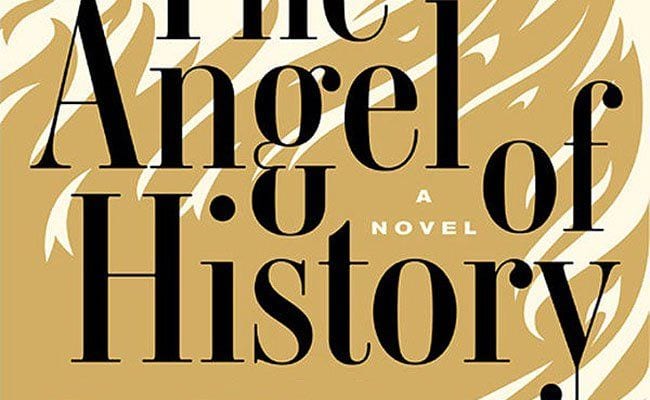
Rabih Alameddine’s The Angel of History is a book told from the twilight, both literally and figuratively. In the early morning hours, Jacob, Satan, Death, and the Fourteen Holy Helpers enter into a collective interrogation of memory as Jacob waits to see a psychiatrist at the local free clinic for the voices in his head. As the various actors discuss Jacob’s past, interspersed with his own journal entries documenting the life of one middle-aged gay man living in San Francisco decades after the AIDS epidemic, the reader is taken on a miasmic wandering through a memory landscape of dead friends and dying kinsmen.
The Angel of History is a poignant act of remembering by one AIDS survivor to a new generation, situated in a disorienting twilit time when his gay brothers have become insiders and his Arab kinsmen have become the new outsiders. It’s an evocative religious and sexual elegiac with both dark and stirring comedy.
Alameddine invites those born after the AIDS epidemic to recognize what life was once like for gay men in America — both the risks and the freedom that comes with being outsiders. Are gay men only the most recently civilized, declawed foreign culture to succumb to the unstoppable might of Western imperialism? When Jacob rebukes two bourgeois 20-something gay men by saying “We refused everything, rejected their heavens and their hells, and you turn around and accept both and you keep saying I do and I do and I do … while they shove you in a tiny vestibule and you pretend it’s Versailles,” it’s hard not to wonder what was the cost of it all.
Countless other novels have been structured to be set within a single day — including Saleem Haddad’s Guapa, another novel published this year about a gay Arab man — while interposing the day with flashbacks and interludes. But Alameddine’s choice to parse Jacob’s memories so patiently by Satan, by Death, by the Fourteen saints, and even by his own journals, sets The Angel of History apart.
Yet, despite the fact that this is a novel about history, memory, and the act of questioning the authenticity of one’s memories, it doesn’t tolerate nostalgia. As Jacob narrates to his late partner, “I loathed the poetry of nostalgia, so I chopped down the olive trees of my ancestors, if I hear one more stanza eulogizing the scent of orange blossoms in Palestine, I will buy a gun, I swear… I despised false domestic poems most.”
The way the novel is written, it could easily have floundered on the fertile ground for excessive commentary. Instead, Alameddine keeps the writing tight and well-ordered, never losing perspective. This is Jacob’s story and while he may exist at the intersection of two different historically oppressed groups, he never wastes time navel-gazing about implications superfluous to the story.
The most satisfying aspect of the novel is the way in which Alameddine explores and has fun playing with the parallels and resemblances between the darker characteristics of gay male culture and of religious history. The Angel of History is a poetic combination of Mapplethorpean imagery and religious symbolism. It’s uncomfortable and enlightening; an experiment in merging the present with the past, in merging a gay life characterized by assimilation with a gay life celebratory of its deviancy. It dances between the ecstasy of sexual release and the ecstasy of religious rapture, as when Alameddine writes, “[He] had me bite a leather strap with teeth marks of novitiates, I bit and bit … and like all saints before me, I relished the ecstasy of martyrdom.”
Jacob suffers from a persistent vertigo as an outsider whose culture became insiders only to watch his Arab brethren become the new target of Western civilizing aspirations. After all, even before he recognized he was gay, Jacob was an outsider among his first culture as a presumed-Muslim living among Lebanese Christians. Alameddine distills this experience down to its most unequivocal image in the obscene, darkly comical short story included in Jacob’s journals of rich, assimilated gay men keeping an Arab Muslim as a bizarre pet-cum-performance art piece.
The inescapable question that hangs over much of the narrative and with which Alameddine rightly chastens us is, “Where were you?” Drawing upon the parable of Job, The Angel of History asks us not only to contemplate a different world for gay men, a world since sacrificed on behalf of mainstream acceptance, but to contemplate what followed. “Homos, homos, homos, kill, kill, kill, fags, dykes, sting ’em, smite ’em, there, there, we feel much better, but now we’re gay-married in the armed forces, so al-Qaeda, al-Qaeda, al-Qaeda, kill, kill, kill, Hamas, Ayatollah, bomb ’em, drone ’em….”
The Angel of History is a novel with numerous lessons, without any of them feeling forced or unnatural. It’s a poetic work of prose about a disenchanted poet who has given up on poetry and tried his hand at prose. Succeeding at both makes it an unforgottable novel. The Angel of History is cathartic tale of outsiders and insiders and what’s lost in becoming each.


![Call for Papers: All Things Reconsidered [MUSIC] May-August 2024](https://www.popmatters.com/wp-content/uploads/2024/04/all-things-reconsidered-call-music-may-2024-720x380.jpg)



